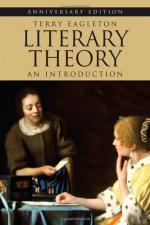
|
| Name: _________________________ | Period: ___________________ |
This quiz consists of 5 multiple choice and 5 short answer questions through Chapter 4, Post-Structuralism.
Multiple Choice Questions
1. From the viewpoint of Roland Barthes, Eagleton argues that "reading is less like a _______ than a _________."
(a) "Philosophy; laboratory."
(b) "Laboratory; boudoir."
(c) "Boudoir; laboratory."
(d) "Boudoir; system."
2. According to Eagleton, why is it an illusion to think that he can be present to us in what he says and writes?
(a) Because he is a concrete entity but language is not.
(b) Because language is only a tool, not something he is made of.
(c) Because he is no longer present in the world but in some other present in the future.
(d) Because the language he uses is not a tool but something he is made of and therefore always divided.
3. According to Eagleton, the women's movement is not just about women having equal status and power as men, it is what?
(a) The rejection of men's status and power.
(b) The acceptance of sexual difference in relations of status and power.
(c) The questioning of all status and power.
(d) The abdication of sex altogether in relations of status and power.
4. What is NOT a material reality in the oppression of women?
(a) Equal wages.
(b) Unequal wages.
(c) Job Discrimination.
(d) Motherhood.
5. What is the name Edmund Husserl gave to his philosophical method?
(a) Reception theory.
(b) Phenomenology.
(c) New criticism.
(d) Hermeneutics.
Short Answer Questions
1. According to Eagleton, the Western philosophical tradition has "consistently vilified" what?
2. How are "writable" texts different from ones that can be read?
3. Who developed hermeneutics?
4. What is "imaginative" literature or literature that is not necessarily true?
5. According to Eagleton, the subject in phenomenology was the source of all what?
|
This section contains 321 words (approx. 2 pages at 300 words per page) |

|




